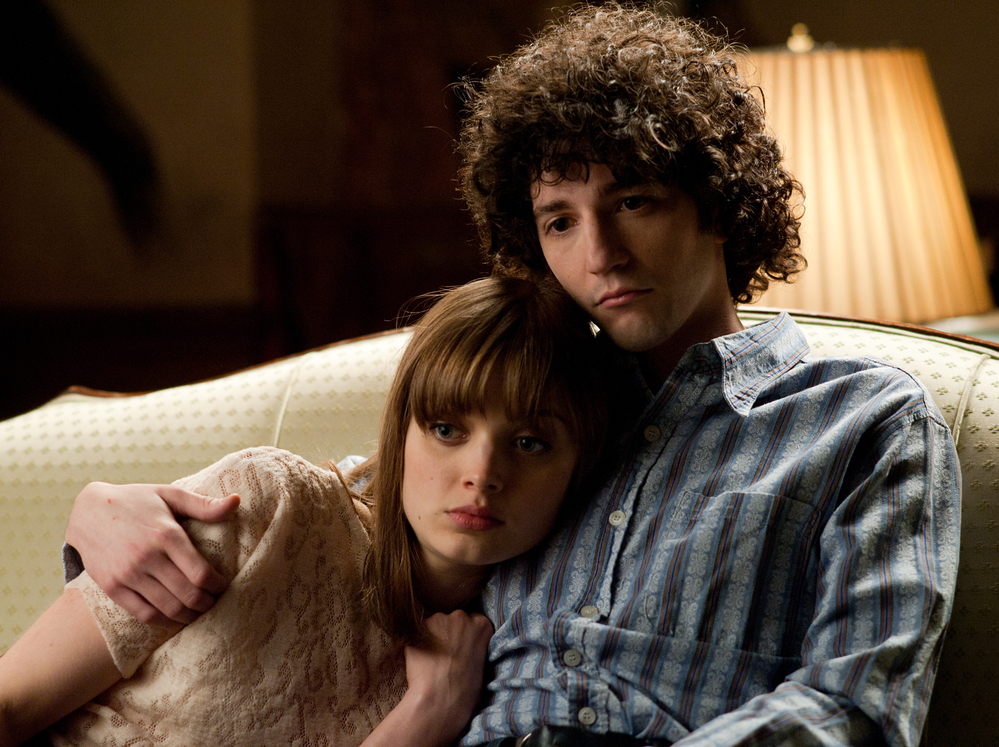
Wells (Will Brill, from left), Joe (Brahm Vaccarella), Douglas (John Magaro) and Eugene (Jack Huston) try to make it big as a rock band in the 1960s.
Barry Wetcher/Paramount PicturesNot Fade Away
Director: David ChaseGenre: DramaRunning time: 112 minutesRated R for pervasive language, some drug use and sexual content
With: John Magaro, Brad Garrett, Christopher McDonald
Basically, Not Fade Away is the saga of a 1960s teenager who plans to become a rock star, but slowly realizes he won't. The movie is set mostly in the New York suburbs. So why does it open in South London, where two lads — you may know them as Mick and Keith — bond over imported blues LPs?
The answer is that writer-director David Chase, after working in TV for almost four decades, wants his first movie to be both sweeping and intimate, world historical as well as autobiographical. That ambition could have been as stirring as the film's soundtrack, assembled with care by Springsteen guitarist Steven Van Zandt, once a cast member of Chase's The Sopranos.
Alas, Not Fade Away is far less pungent than the period it attempts to evoke. The main story begins in 1964, as the dowdy American media introduce the new British rock. Working-class high-schooler Douglas (John Magaro) hears "I Want to Hold Your Hand" on the radio and is transformed. Even more stunning are The Rolling Stones — often heard, but never glimpsed again after that prologue. Their potency is undiminished by having to endure Hollywood Palace host Dean Martin's mop-top jibes.
Douglas becomes a drummer and starts a group with several friends; they play Bo Diddley, Stones and Kinks covers at parties, where Douglas gazes longingly at Grace (Bella Heathcote), who may be too pretty for him, and is definitely too rich. A year later, college and longer hair have made Douglas cooler, and when he moves from drums to lead vocals, Grace notices. They begin a relationship that will survive several upsets, and perhaps all the way to the movie's open-ended conclusion, somewhere in the vicinity of Hollywood and 1968.
Grace Dietz (Bella Heathcote) and Douglas discover the highs and lows of young love.
Barry Wetcher/Paramount Pictures Grace Dietz (Bella Heathcote) and Douglas discover the highs and lows of young love.Barry Wetcher/Paramount Pictures
Grace Dietz (Bella Heathcote) and Douglas discover the highs and lows of young love.Barry Wetcher/Paramount Pictures With her '60s bangs and timeless cheekbones, Heathcote resembles the beauties photographed with the likes of Jagger and McCartney in the Swinging London days. But her shallow, decorative role as The Girlfriend is as outmoded as Dean Martin's banter.
Music drives the movie, and the producers popped for the real stuff: Robert Johnson, Moby Grape and — curiously — the Sex Pistols are all here. The soundtrack is so overstuffed that it relegates Beatles and Dylan tunes to the end credits.
Chase's scenario integrates a few genuine music-biz insiders (such as songwriter Jerry Ragovoy, impersonated by Brad Garrett), and includes an original number written for Douglas' group by Van Zandt. (It's no "That Thing You Do.") Finally, the movie suggests the presence of another, more infamous character from the era.
Shoehorned around the a-star-isn't-born plot is another whole movie's worth of family stuff. At Douglas' house, there's tension with a dad (Sopranos mainstay James Gandolfini) who doesn't want the times to be a-changin', as well as a mother-daughter tampon discussion so odd it be must a genuine Chase family memory. At Grace's more upscale home, her parents plot to institutionalize their other daughter, one of several traumas the movie can't quite assimilate into its nostalgic tone.
Eventually, Douglas concludes that he's more interested in directing than in singing. He's always been a Twilight Zone fan — an underdeveloped motif in a movie whose working title was The Twylight Zones — but now he and Grace are watching Welles' A Touch of Evil and Antonioni's Blow-Up. But not, apparently, anything by Godard, who used to stitch '60s culture and politics into invigorating, experimental cine-essays. Not Fade Away is considerably more stolid, revealing Chase's grounding in TV. It has flashes of '60s spirit, but enough plot for a miniseries and the sensibility of a period dramedy.
No comments:
Post a Comment